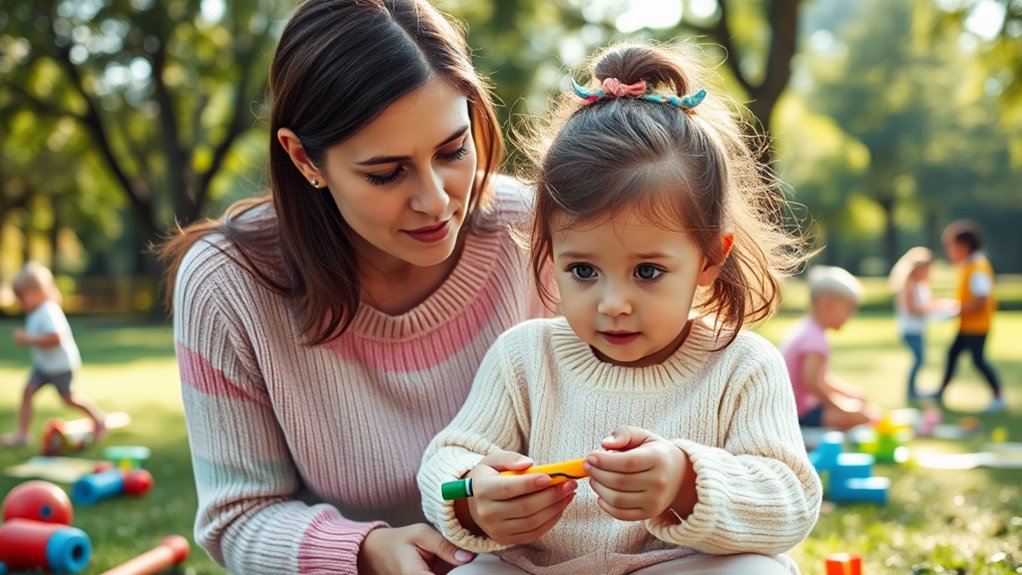The Role of Communication in Helicopter Parenting
Communication in helicopter parenting is essential, as it shapes how you guide your child. If your style is too directive, it may limit their self-expression and independence. Instead, focus on supportive dialogue that encourages open conversations. Use active listening and ask open-ended questions to help your child feel valued and understood. Balancing guidance with freedom allows them to develop problem-solving skills and confidence. Remember, the way you communicate can either empower them or create dependency. By mastering effective communication techniques, you can foster resilience and independence in your child, leading to long-term success. There’s much more to explore on this topic!
Understanding Helicopter Parenting

In the domain of modern parenting, helicopter parenting has emerged as a notable trend that often sparks debate. You might wonder what helicopter parenting really means. Fundamentally, it refers to parents who closely monitor their children, often swooping in to manage their lives. This style can be well-intentioned, as you likely want the best for your child. However, it may also limit their independence.
When you constantly intervene, your child might struggle to develop vital life skills. Think about it: if you handle every challenge for them, how will they learn to solve problems on their own? It’s important to strike a balance between guidance and allowing your child to take risks. You can foster resilience by letting them face manageable challenges, which ultimately helps them grow.
Moreover, helicopter parenting can lead to stress for both you and your child. If you’re always hovering, it might create pressure to meet high expectations. Instead, consider stepping back occasionally. Encourage your child to make decisions and learn from their experiences.
After all, parenting is about helping your child thrive in the world, and sometimes that means giving them the freedom to fly.
Communication Styles and Their Impact

Effective communication plays an essential role in helicopter parenting, shaping the parent-child relationship in profound ways. Your communication style can either strengthen your bond or create barriers.
For instance, if you tend to be overly directive, your child might feel smothered and less likely to express their feelings. Instead of fostering open dialogue, this approach can lead to resentment and withdrawal.
On the other hand, adopting a more supportive and empathetic communication style encourages your child to share their thoughts. When you listen actively and validate their feelings, you create an environment where they feel safe to open up.
This two-way communication helps build trust, making it easier for your child to approach you with concerns.
Moreover, using clear and positive language can enhance understanding. Instead of telling your child what to do, try asking questions that guide them to think critically about their choices.
This method not only promotes independence but also reinforces your role as a supportive figure rather than just an authority.
Ultimately, the way you communicate can greatly impact your child’s emotional well-being and development, paving the way for a healthier relationship.
Balancing Guidance and Independence

Finding the right balance between guidance and independence can be challenging for helicopter parents. You want to support your child, but it’s also essential to give them the space to grow. When you hover too much, your child may struggle to develop confidence and decision-making skills.
Instead, aim to be a guiding presence without taking control of every situation. Start by recognizing your child’s strengths and interests. Encourage them to pursue activities that excite them, allowing them to make choices.
When they face challenges, offer advice and support, but resist the urge to step in and solve problems for them. This way, they learn to navigate obstacles independently.
Communicate openly about the importance of independence. Explain that making mistakes is a significant part of learning. Celebrate their successes, no matter how small, to reinforce their self-esteem.
Strategies for Effective Communication

Clear communication is essential for helicopter parents aiming to foster independence in their children. To achieve this, start by listening actively. When your child shares thoughts or feelings, give them your full attention. This shows you value their opinions and encourages them to open up more.
Next, ask open-ended questions. Instead of yes-or-no questions, try asking, “What do you think about that?” This encourages deeper conversations and helps your child express themselves.
Another key strategy is to share your own experiences. Relating your stories can provide valuable lessons without sounding preachy. It also helps your child see that everyone makes mistakes and learns from them.
Lastly, set clear expectations. When your child knows what you expect, they can work towards independence more effectively. Explain your reasoning; this helps them understand the “why” behind your guidance.
Long-term Effects on Children

While helicopter parenting might seem beneficial in the short term, its long-term effects on children can be significant and often detrimental. When you constantly swoop in to solve problems for your child, you might believe you’re helping, but you could actually be hindering their development.
Kids raised in this environment often struggle with independence, as they haven’t had the chance to learn from their mistakes. As they grow older, they might find it challenging to make decisions or manage their own lives. You may notice they lack confidence, feeling unsure about their abilities.
Additionally, these children can develop anxiety, fearing failure because they’ve been shielded from real-life challenges.
Moreover, the relationship you maintain with your child can be affected. They might feel resentful or unable to communicate openly because they’ve learned to rely on you rather than their own judgment. This can lead to a cycle of dependency that’s hard to break.
In the end, while your intentions are good, fostering a little independence can help your child thrive as they navigate the world, building resilience and self-confidence along the way.
